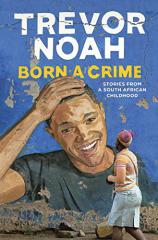Born a Crime: Stories from a South African Childhood
Review
Born a Crime: Stories from a South African Childhood
When Trevor Noah was born, his very existence was a crime. Both his father and mother were criminals for producing a child. The place was South Africa during the apartheid regime; Trevor’s father was a white foreigner, and his mother a native African.
Even the terms “white” and “black,” as Noah informs us with acerbic humor, were not “black and white” in that era. Race was a phenomenon purely of color, and color, however subtle, was the divider between the haves and the have-nots. His mother, a bon vivant with a typing certification, met his father, a Swiss businessman twice her age, in the peculiar enclave of Hillbrow, where the races could bump elbows for business and pleasure. The boy could be with his father, or his mother, but never the two together. His mother was once forced to deny that he was her son, simply to save both of them from disastrous social consequences. His father, who never married his mother despite his avowed anti-racism, was a very private person, and gladly saw his son on weekends and Christmas, but walked on the other side of the street when the “family” went out “together.” In this through-the-looking-glass ambiance, Noah suffered for his too-dark light skin. He was the object of bullying, and his mischievous nature did not make matters easier.
"Noah’s book, more personal than polemic, shows him drawing his own personal power from his remarkably strong, nervy single mom."
Now a rising international comedy star with a regular seat on Comedy Central’s “The Daily Show” and feet in his home country as well as the US and Europe, Noah makes the craziness, danger, deprivation and racial stratification of his younger days seem funny. Except when it wasn’t. Scattered among his childhood recollections are brief historical glimpses into the ugly face of apartheid. As a teenager who had made his way up the social ladder as an entrepreneur turned disc jockey, he had a friend named Hitler. Speaking of this unusual moniker, Noah opines that though Adolf Hitler was a monster, the perception is partly due to the quantifiable number of lives he obliterated. But when the whites ravaged and rampaged their way through Africa, “they weren’t counting the black people they slaughtered.” So, just as Jewish people might wish to go back in time and kill Hitler, a South African would aim for Cecil Rhodes.
Noah’s book, more personal than polemic, shows him drawing his own personal power from his remarkably strong, nervy single mom. She survived a surprise shooting attack by her erstwhile lover; always believed that Jesus would see the little family through, taking her son to at least three different kinds of churches every Sunday; and stayed mobile, literally running for her life when necessary. Despite the poverty that dogged them, his mother always found ways to be happy with her son, with a bad car, a tiny house, and picnics of baloney, brown bread and margarine.
Noah says that “my mother showed me what was possible,” but what was remarkable was that “no one showed her.” With the remnants of apartheid only slowly crumbling, and life’s necessities always just slightly out of reach, she inspired Noah to stay out of the ghetto, reject the ghetto mentality, and never look back.
Reviewed by Barbara Bamberger Scott on November 22, 2016
Born a Crime: Stories from a South African Childhood
- Publication Date: November 15, 2016
- Genres: Essays, Memoir, Nonfiction
- Hardcover: 304 pages
- Publisher: Spiegel & Grau
- ISBN-10: 0399588175
- ISBN-13: 9780399588174











